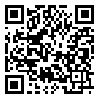Volume 36, Issue 145 (January 2024)
IJN 2024, 36(145): 476-489 |
Back to browse issues page
Download citation:
BibTeX | RIS | EndNote | Medlars | ProCite | Reference Manager | RefWorks
Send citation to:



BibTeX | RIS | EndNote | Medlars | ProCite | Reference Manager | RefWorks
Send citation to:
Inanlou M, Tork Z, Haghani S. Intolerance of Uncertainty During the COVID-19 Pandemic Among Nurses Working in Teaching Hospitals in Tehran, Iran. IJN 2024; 36 (145) :476-489
URL: http://ijn.iums.ac.ir/article-1-3548-en.html
URL: http://ijn.iums.ac.ir/article-1-3548-en.html
1- Department of Psychiatric Nursing, School of Nursing & Midwifery, Iran University of Medical Science, Tehran, Iran.
2- Department of Psychiatric Nursing, School of Nursing & Midwifery, Iran University of Medical Science, Tehran, Iran. ,torkzahra1@gmail.com
3- Department of Biostatistics, Nursing and Midwifery Care Research Center, Iran University of Medical Science, Tehran, Iran.
2- Department of Psychiatric Nursing, School of Nursing & Midwifery, Iran University of Medical Science, Tehran, Iran. ,
3- Department of Biostatistics, Nursing and Midwifery Care Research Center, Iran University of Medical Science, Tehran, Iran.
Abstract: (2123 Views)
Background & Aims Nurses on the frontline of fight against COVID-19 faced with many stressors. The unpredictability of the situation and the seriousness of the risk can lead to intolerance of uncertainty (IU) in them. Nurses with IU perceive uncertainties about COVID-19 as distressing and stressful, and experience severe anxiety and worry. Anxiety in such situations leads to cognitive avoidance, rumination or other maladaptive coping strategies. The present study aims to determine the IU status during the COVID-19 pandemic in nurses working in teaching hospitals in Tehran, Iran.
Materials & Methods This descriptive cross-sectional study was conducted in 2020 on 240 nurses working in the coronavirus wards of teaching hospitals affiliated to Iran University of Medical Sciences, whowere selected by a census sampling method and based on the inclusion criteria. A demographic form and Freeston et al.’s intolerance of uncertainty scale (IUS) were completed by them. Data analysis was performed in SPSS software, version 16, using descriptive and inferential statistics.
Results The mean score of IU was 62.58±20.36. The stress dimension of IUS showed the highest score (2.49±0.78) while the dimension of inability to take action showed the lowest score (2.15±0.80). The COVID-19 infection was significantly associated with IU (P=0.048).
Conclusion The nurses working in the coronavirus wards of selected teaching hospitals had IU during the COVID-19 pandemic such that they had more IU regarding stress, but the amount of IU was not so high that can make them unable to perform their duties. Providing education to nurses on how to break the cycle of anxiety and IU, changing their beliefs about IU, reducing their negative orientation to problems, controlling and monitoring their performance, and facilitating the provision of care can help optimize nursing care and achieve quality patient care during health-related crises.
Materials & Methods This descriptive cross-sectional study was conducted in 2020 on 240 nurses working in the coronavirus wards of teaching hospitals affiliated to Iran University of Medical Sciences, whowere selected by a census sampling method and based on the inclusion criteria. A demographic form and Freeston et al.’s intolerance of uncertainty scale (IUS) were completed by them. Data analysis was performed in SPSS software, version 16, using descriptive and inferential statistics.
Results The mean score of IU was 62.58±20.36. The stress dimension of IUS showed the highest score (2.49±0.78) while the dimension of inability to take action showed the lowest score (2.15±0.80). The COVID-19 infection was significantly associated with IU (P=0.048).
Conclusion The nurses working in the coronavirus wards of selected teaching hospitals had IU during the COVID-19 pandemic such that they had more IU regarding stress, but the amount of IU was not so high that can make them unable to perform their duties. Providing education to nurses on how to break the cycle of anxiety and IU, changing their beliefs about IU, reducing their negative orientation to problems, controlling and monitoring their performance, and facilitating the provision of care can help optimize nursing care and achieve quality patient care during health-related crises.
Type of Study: Research |
Subject:
nursing
Received: 2022/03/3 | Accepted: 2023/12/20 | Published: 2023/12/22
Received: 2022/03/3 | Accepted: 2023/12/20 | Published: 2023/12/22
Send email to the article author
| Rights and permissions | |
 |
This work is licensed under a Creative Commons Attribution-NonCommercial 4.0 International License. |







